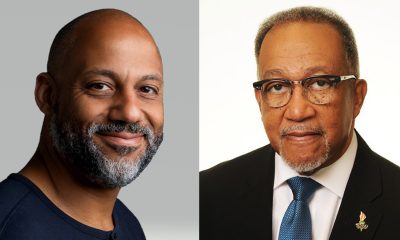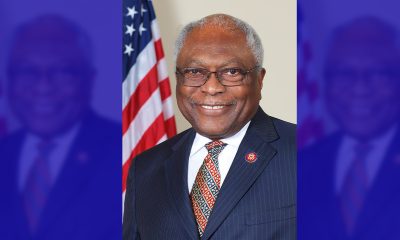Politics
Bush, Rubio, Bring Spanish Fluency to 2016 Campaign

In this April 28, 2015, photo, Republican presidential hopeful Sen. Marco Rubio, R-Fla., speaks at an event organized by Town Hall Los Angeles in Los Angeles. Republicans are bringing something unique to the 2016 presidential campaign: an ability to speak to Americans in both of their main mother tongues, Spanish as well as English. It remains to be seen how much Jeb Bush and Rubio will use their fluent Spanish in the campaign. (AP Photo/Jae C. Hong)
WILL WEISSERT, Associated Press
CALVIN WOODWARD, Associated Press
AUSTIN, Texas (AP) — Republicans are bringing something unique to the 2016 presidential campaign: an ability to speak to Americans in both of their main mother tongues, Spanish as well as English.
Democrats can’t match it. Previous GOP candidates couldn’t.
But now, paradoxically, the party that’s on the outs with many Hispanic voters over immigration is the party that has serious presidential candidates who are surefooted in their language.
It remains to be seen how much Jeb Bush and Marco Rubio will use their fluent Spanish in the campaign. Rubio offered a few words of it in his presidential campaign announcement, quoting his Cuban grandfather, a small but notable addition in a speech meant for everyone to hear, not just a Hispanic crowd.
Bush peppered his remarks with Spanish in Puerto Rico on Tuesday, making an obvious cultural connection with many in his audience.
Even a modest amount of Spanish will be more than presidential campaigns have known.
President George W. Bush rarely used his barely high school-level Spanish and, when he did, it was a token nod, not a real conversation. President Barack Obama and 2016 Democratic presidential contender Hillary Rodham Clinton have gamely tried a few lines now and then.
Bilingualism is a tricky issue in politics and you can be sure that careful calculations are being made on how and when to display it in the Bush and Rubio campaigns.
Bush the former governor and Rubio the senator have spoken Spanish liberally in Florida politics and other settings. But this is a national campaign for the highest office.
Republicans, on the one hand, want to win over Hispanic voters. On the other, they want to avoid upsetting some traditional supporters who — whether because of immigration concerns, nativism or simple cultural tradition — want English only.
A second Hispanic-American in the Republican race, Texas Sen. Ted Cruz, has largely lost the language of his Cuban-born father and calls his Spanish “lousy.” (Another contender, former Texas Gov. Rick Perry, also is not fluent.)
Should Bush or Rubio go on to win the nomination, and should Clinton take the Democratic prize, history is sure to be made in 2016. After having elected the first black president, Americans would now be putting either the first fluent Spanish-speaker, or the first woman, in the presidency.
HOW MUCH DOES LANGUAGE MATTER?
No one thinks speaking Spanish is an easy ticket to Hispanic votes. Especially for Republicans, who saw Obama take 71 percent of the Hispanic vote in 2012.
But it’s a sign of respect, says Bob Quasius, founder of Cafe Con Leche Republicans, which presses for the Republican Party to become more inclusive of Hispanics. “Even if your Spanish isn’t very good, it’s welcome.”
Hispanic turnout has increased in every election for nearly three decades, meaning it may top 10 percent of the electorate in 2016, according to Mark Hugo Lopez, director of Hispanic Research at the Pew Research Center. Even so, among registered Hispanic voters, 83 percent prefer English or are bilingual, Pew has found. Only 17 percent identify Spanish as their dominant language. Spanish is much more heavily preferred among Latinos who are not registered to vote.
“If a candidate can speak Spanish, it could at least get Hispanics interested,” Lopez said. “But it’s not going to be the deciding factor.”
___
RUBIO
The son of Cuban immigrants, Rubio hails from heavily Hispanic West Miami and grew up bilingual. He shifts comfortably between the two languages while running Senate meetings, appearing at news conferences and interacting with people.
Rubio delivered two versions of the 2013 Republican response to Obama’s State of the Union, in English and Spanish. As a Senate candidate, he used both languages with South Florida crowds.
Al Cardenas, former head of the Florida Republican Party, remembers Rubio firing up volunteers in the two languages while working for Bob Dole’s unsuccessful 1996 White House run.
“He was then, and he is now, just as comfortable doing that in one language as the other,” Cardenas said.
It’s too early to know how much Rubio will do that outside of Hispanic-heavy events in the presidential campaign. When he spoke about his grandfather to Iowa social conservatives on the weekend, he did not use Spanish.
___
BUSH
Bush speaks Spanish at home with his Mexican-born wife, Columba, and whenever he encounters people who approach him in that language. Like Rubio, he clearly wants to draw more Latinos behind his effort, and he can be expected to address a variety of Hispanic functions, as he was doing Wednesday in Houston.
He earned thunderous applause in Puerto Rico at events where he mixed English with effortless Spanish.
“I love it,” said Maria Elena Cruz, a 59-year-old government worker from Toa Baja. “He speaks Spanish just like us.”
“That makes us feel good,” said Paola Bazzano, 72, a doctor’s assistant. “It’s a way to establish good rapport.”
How far he will go with his bilingualism, though, is not yet apparent.
His speech announcing his candidacy, whenever it comes, will offer a clue as to what he will do when speaking to a national audience. Will he say a few words of Spanish, like Rubio? Make a bolder statement, with even more?
___
CRUZ
Cruz is the first Hispanic senator from Texas, where many residents are native Spanish speakers. He struggles with the language, however, and nixed a proposal for a debate in Spanish in his 2012 Senate campaign.
“Like many second-generation Hispanic immigrants, he is conversational, though not fluent in Spanish,” Cruz spokeswoman Catherine Frazier said. “But that will not hinder his efforts to build a robust Hispanic outreach operation.”
___
Associated Press writer Danica Coto contributed to this report from San Juan, Puerto Rico. Woodward reported from Washington.
Copyright 2015 The Associated Press. All rights reserved. This material may not be published, broadcast, rewritten or redistributed.
Activism
Oakland Post: Week of April 24 – 30, 2024
The printed Weekly Edition of the Oakland Post: Week of April 24 – 30, 2024

To enlarge your view of this issue, use the slider, magnifying glass icon or full page icon in the lower right corner of the browser window. ![]()
Bay Area
MAYOR BREED ANNOUNCES $53 MILLION FEDERAL GRANT FOR SAN FRANCISCO’S HOMELESS PROGRAMS
San Francisco, CA – Mayor London N. Breed today announced that the U.S. Department of Housing and Urban Development (HUD) has awarded the city a $53.7 million grant to support efforts to renew and expand critical services and housing for people experiencing homelessness in San Francisco.

FOR IMMEDIATE RELEASE:
Wednesday, January 31, 2024
Contact: Mayor’s Office of Communications, mayorspressoffice@sfgov.org
***PRESS RELEASE***
MAYOR BREED ANNOUNCES $53 MILLION FEDERAL GRANT FOR SAN FRANCISCO’S HOMELESS PROGRAMS
HUD’s Continuum of Care grant will support the City’s range of critical services and programs, including permanent supportive housing, rapid re-housing, and improved access to housing for survivors of domestic violence
San Francisco, CA – Mayor London N. Breed today announced that the U.S. Department of Housing and Urban Development (HUD) has awarded the city a $53.7 million grant to support efforts to renew and expand critical services and housing for people experiencing homelessness in San Francisco.
HUD’s Continuum of Care (CoC) program is designed to support local programs with the goal of ending homelessness for individuals, families, and Transitional Age Youth.
This funding supports the city’s ongoing efforts that have helped more than 15,000 people exit homelessness since 2018 through City programs including direct housing placements and relocation assistance. During that time San Francisco has also increased housing slots by 50%. San Francisco has the most permanent supportive housing of any county in the Bay Area, and the second most slots per capita than any city in the country.
“In San Francisco, we have worked aggressively to increase housing, shelter, and services for people experiencing homelessness, and we are building on these efforts every day,” said Mayor London Breed. “Every day our encampment outreach workers are going out to bring people indoors and our City workers are connecting people to housing and shelter. This support from the federal government is critical and will allow us to serve people in need and address encampments in our neighborhoods.”
The funding towards supporting the renewal projects in San Francisco include financial support for a mix of permanent supportive housing, rapid re-housing, and transitional housing projects. In addition, the CoC award will support Coordinated Entry projects to centralize the City’s various efforts to address homelessness. This includes $2.1 million in funding for the Coordinated Entry system to improve access to housing for youth and survivors of domestic violence.
“This is a good day for San Francisco,” said Shireen McSpadden, executive director of the Department of Homelessness and Supportive Housing. “HUD’s Continuum of Care funding provides vital resources to a diversity of programs and projects that have helped people to stabilize in our community. This funding is a testament to our work and the work of our nonprofit partners.”
The 2024 Continuum of Care Renewal Awards Include:
- $42.2 million for 29 renewal PSH projects that serve chronically homeless, veterans, and youth
- $318,000 for one new PSH project, which will provide 98 affordable homes for low-income seniors in the Richmond District
- $445,00 for one Transitional Housing (TH) project serving youth
- $6.4 million dedicated to four Rapid Rehousing (RRH) projects that serve families, youth, and survivors of domestic violence
- $750,00 for two Homeless Management Information System (HMIS) projects
- $2.1 million for three Coordinated Entry projects that serve families, youth, chronically homeless, and survivors of domestic violence
In addition, the 2023 CoC Planning Grant, now increased to $1,500,000 from $1,250,000, was also approved. Planning grants are submitted non-competitively and may be used to carry out the duties of operating a CoC, such as system evaluation and planning, monitoring, project and system performance improvement, providing trainings, partner collaborations, and conducting the PIT Count.
“We are very appreciative of HUD’s support in fulfilling our funding request for these critically important projects for San Francisco that help so many people trying to exit homelessness,” said Del Seymour, co-chair of the Local Homeless Coordinating Board. “This funding will make a real difference to people seeking services and support in their journey out of homelessness.”
In comparison to last year’s competition, this represents a $770,000 increase in funding, due to a new PSH project that was funded, an increase in some unit type Fair Market Rents (FMRs) and the larger CoC Planning Grant. In a year where more projects had to compete nationally against other communities, this represents a significant increase.
Nationally, HUD awarded nearly $3.16 billion for over 7,000 local homeless housing and service programs including new projects and renewals across the United States.
Activism
Oakland Post: Week of April 17 – 23, 2024
The printed Weekly Edition of the Oakland Post: Week of April 17 – 23, 2024

To enlarge your view of this issue, use the slider, magnifying glass icon or full page icon in the lower right corner of the browser window. ![]()
-

 Activism4 weeks ago
Activism4 weeks agoOakland Post: Week of March 27 – April 2, 2024
-

 #NNPA BlackPress4 weeks ago
#NNPA BlackPress4 weeks agoCOMMENTARY: D.C. Crime Bill Fails to Address Root Causes of Violence and Incarceration
-

 #NNPA BlackPress4 weeks ago
#NNPA BlackPress4 weeks agoMayor, City Council President React to May 31 Closing of Birmingham-Southern College
-

 #NNPA BlackPress4 weeks ago
#NNPA BlackPress4 weeks agoBeloved Actor and Activist Louis Cameron Gossett Jr. Dies at 87
-

 Community1 week ago
Community1 week agoFinancial Assistance Bill for Descendants of Enslaved Persons to Help Them Purchase, Own, or Maintain a Home
-

 Activism3 weeks ago
Activism3 weeks agoOakland Post: Week of April 3 – 6, 2024
-

 Business1 week ago
Business1 week agoV.P. Kamala Harris: Americans With Criminal Records Will Soon Be Eligible for SBA Loans
-

 Activism2 weeks ago
Activism2 weeks agoOakland Post: Week of April 10 – 16, 2024























































